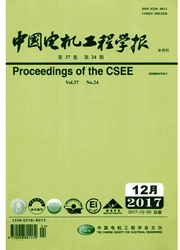

 中文摘要:
中文摘要:
针对变压器油频域介电谱低频部分弥散现象的原因,即电极极化进行了研究。分析了变压器油隙在低频正弦激励下内部离子动态分布的过程,建立了离子分布模型,依据离子分布构建了弛豫时间和德拜(Debye)长度的表达函数,并用于Debye弛豫模型的参数计算,从而得到了以电极极化为基础的介电参数方程。计算并分析了所述试验条件下的电极极化参数,通过仿真与实测数据的对比,验证了电极极化模型及其相应介电参数方程的正确性。研究结果表明:仿真电流与试验测试电流相符合,建立的离子分布模型能够有效地表征变压器油隙频域介电响应中的电极极化机制;介电参数计算值与试验测值相符合,建立的介电参数方程能够有效地表征变压器油频域介电响应中受电极极化作用时的介电参数。所建立的离子分布模型与介电参数方程能够给油纸绝缘频域介电谱低频弥散特性研究提供基础,以便更好的将频域介电谱技术应用到工程中。
 英文摘要:
英文摘要:
This paper studied the electrode polarization which is the reason of the low frequency dispersion existing in the dielectric spectroscopy of transformer oil. The ionic dynamic distribution of oil gap was analyzed when it was applied low frequency sinusoidal excitation. A model was established which describes the distribution of ionic concentration during the testing process. The expressions of relaxation time and Debye length were obtained based on the ionic distribution model. The electrode polarization parameters were used to calculate the parameters of Debye relaxation model, then the expression of dielectric constants were obtained. The validity of established model and the expression about dielectric constants were testified by comparing the simulated and measured results. The results show that: the simulated current can match the measured current well, thus the established model can reflect the mechanism of electrode polarization existing in the dielectric response of transformer oil; the calculated dielectric parameters can match the measured dielectric parameters well, thus the established expressions about dielectric parameters is effective when the dielectric response of transformer oil is under the effects of electrode polarization. The established ionic distribution model and dielectric parameters expressions can provide the basis of studying the characteristics of low frequency dispersion existing in dielectric spectroscopy of oil-paper insulation and be help for the usage of frequency domain spectroscopy technique in engineering.
 同期刊论文项目
同期刊论文项目
 同项目期刊论文
同项目期刊论文
 期刊信息
期刊信息
